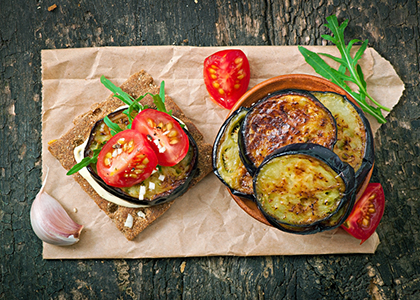
Are Nightshade Vegetables Right For You?
By Claire Georgiou, Reboot Naturopath, B.HSc ND
In entertainment news recently, we heard all about Gisele and Tom Brady’s diet. One thing they avoid: Nightshade vegetables. So let’s talk about these veggies and see if they are right for you and your diet. Hint: Just because they avoid them doesn’t mean you have to!
What are nightshades?
Members of the family Solanaceae, common nightshades include white potatoes, eggplant, tomatoes, and peppers, chili peppers, jalapenos and sweeter bell peppers (capsicum). The spices paprika and cayenne are also included in this group. There are many other nightshade family plants, over 2,000 actually, and many are toxic to humans, with the most well-known being belladonna, also called the deadly nightshade, historically valued for its use as a poison.
Who should avoid nightshades?
Nightshade vegetables are particularly concerning for some people that may have a compromised gut and immune system which includes rheumatoid arthritis, joint and muscle pain, leaky gut, autoimmune disease and other related conditions.
Nightshade vegetables contain a group of chemical compounds called alkaloids; these are the plant’s own natural pesticide and fungicide defense compounds. These naturally occurring plant constituents tend to concentrate in the leaves and stems mostly and exist in much smaller quantities in the actual edible parts which are generally harmless.
Dr. Childers, who conducted a 20-year study on the connection between nightshades and arthritis, concluded that 74-90% of people who suffer with pain and inflammation may have a sensitivity to nightshades.
In one study, the alkaloids found in potato skins were found to be irritating to mice who had inflammatory bowel disease (IBD), which is an autoimmune disease, that is gut and immune specific. These mice had a significant aggravation to their intestinal mucosa; these alkaloids tend to concentrate in the skins and they found the higher the alkaloid content, the worse the aggravation.
The alkaloids in nightshades have been shown to inhibit the enzyme cholinesterase, which helps to regulate muscle flexibility. This impairment may then result in muscle spasm, aches, pains, inflammation and stiffness.
A type of alkaloid called solanine found in potatoes and tomatoes can actually accumulate in the body and can be released in times of stress thus stimulating inflammation in sensitive individuals.
Nightshades also contain calcitriol, when consumed in excess, promotes high levels of calcium in the bloodstream thus contributing to calcium deposits in the soft tissue causing inflammation which has been found with excess potato consumption.
Nightshades also contain high levels of saponins and lectins which can be problematic in cases of gut irritation in sensitive individuals and can aggravate an already irritated digestive system.
For some, peppers and tomatoes can irritate the stomach and esophagus causing heartburn and reflux in sensitive individuals.
In people that may be only slightly sensitive, total elimination may not be necessary but rather a reduction for improved joint and pain management.
To reduce the alkaloids that may be problematic for you:
- Peel potatoes and avoid green potatoes always
- Avoid sprouting potatoes (higher solanine content)
- Only consume ripe nightshades, avoid green tomatoes
- Cooking nightshade vegetables also reduces these effects
Who CAN eat nightshades?
When someone has a healthy immune system and a healthy gut these compounds are harmless and do not cause any ill effects, and in fact are often beneficial and offer an array of health benefits. While for others that may be sensitive, these compounds can stimulate the immune system and irritate the gut when they are already compromised and stimulate an increased inflammatory response.
If you suspect nightshades are aggravating your arthritis or autoimmune disease then avoid them for 14-30 days, then reintroduce them one by one every 3 days and take particular note and observe if any of these vegetables are possibly contributing to your inflammation and pain.
Nightshade Substitutions
It is important to note that if you are not sensitive to nightshades, they are a highly beneficial food that contain many important nutrients, compounds and valuable antioxidants.
Nightshade Substitution
Tomatoes: Red cabbage, red grapes, beets, plums, mushrooms
Pepper or tomato sauce: Relishes, pickles, chutney’s, sauerkraut, mustard, horseradish, ginger, ground peppercorns.
Potato: Sweet potato, parsnips, turnips, carrots, yams, cauliflower
Peppers: Radishes, daikon, scallions, red onion, celery